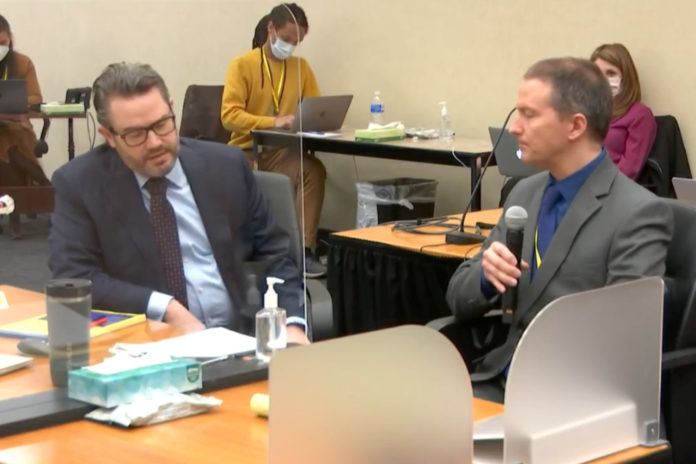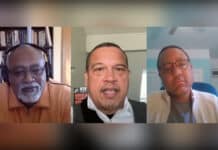Thursday, April 15
All evidence has been presented in the case. Court will resume Monday at 9 a.m. for closing arguments, after which the jury will go into deliberation and sequestration.
The defense rested their case Thursday morning. Judge Cahill allowed the prosecution to call a rebuttal witness to testify on carbon monoxide effects on the body, a topic brought up by the defense yesterday.
Derek Chauvin invoked his Fifth Amendment right Thursday morning. He will not testify. He said the decision is solely his own, not the decision of his attorney.
Judge Cahill read the instruction he will read to the jury, approved by Chauvin.
“The state must convince you by evidence beyond a reasonable doubt that the defendant is guilty of the crime charged. The defendant has no obligation to prove innocence. The defendant has the right not to testify. This right is guaranteed by the federal and state constitutions. You should not draw any inference from the fact that the defendant has not testified in this case,” said the statement.
BREAKING: Derek Chauvin will invoke his Fifth Amendment right. He will not testify. He tells Judge Cahill it is solely his decision, not the decision of his attorney. pic.twitter.com/0GBzKS6P4H
— Alpha News (@AlphaNewsMN) April 15, 2021
The defense rests their case. The prosecution is now calling a rebuttal witness. pic.twitter.com/JWeodS3knW
— Alpha News (@AlphaNewsMN) April 15, 2021
Wednesday, April 14
Dr. David Fowler, forensic pathologist, testified for the defense Wednesday. He explained the side effects of fentanyl, which include slowing down respiration and decreasing oxygen in the bloodstream.
Fowler determined the manner of George Floyd’s death to be “undetermined,” due to “so many conflicting” manners, including carbon monoxide exposure from the squad car’s exhaust pipe, drug usage, natural disease, the presence of a tumor, and restraint.
However, he said the cause of death was heart disease, with a number of contributing factors, during restraint.
On cross examination, Fowler, “as a physician,” agreed that George Floyd should have been given immediate medical attention at the time he went into cardiac arrest.
On cross examination, Fowler was shown a still photo of Chauvin’s arm gripped around Floyd’s neck during the struggle in the squad car. On redirect, Fowler was shown body camera footage, rather than a single photo, of that same moment, and testified that Chauvin’s arm was “very loose” on Floyd. There was a “considerable gap” between Chauvin’s arm and Floyd’s neck, Fowler said.
Dr. David Fowler, forensic pathologist, testifies for the defense. He explains that fentanyl slows down respiration and decreases oxygen in the bloodstream. pic.twitter.com/vghFugY71s
— Alpha News (@AlphaNewsMN) April 14, 2021
Dr. Fowler determines the manner of George Floyd's death to be undetermined, due to "so many conflicting" manners, including carbon monoxide exposure, drug usage, natural disease, the presence of a tumor, and restraint. pic.twitter.com/duwhsiAZ03
— Alpha News (@AlphaNewsMN) April 14, 2021
On cross examination, Dr. Fowler, "as a physician," agrees that George Floyd should have been given immediate medical attention at the time he went into cardiac arrest. pic.twitter.com/naM8vdADa5
— Alpha News (@AlphaNewsMN) April 14, 2021
On cross examination, Dr. Fowler was shown a photo of Chauvin's arm gripped around George Floyd's neck while struggling with him. On redirect, Fowler is shown body cam footage, rather than a single photo, of that moment, and testifies that Chauvin's arm is "very loose" on Floyd. pic.twitter.com/rHXdc6w5b8
— Alpha News (@AlphaNewsMN) April 14, 2021
Morries Hall, George Floyd’s alleged drug dealer, invoked his Fifth Amendment right in court Wednesday morning. Judge Peter Cahill found his invocation against self-incrimination valid and will not require Hall to testify.
Morries Hall invokes his Fifth Amendment right against self-incrimination. Judge Cahill finds his invocation valid, and Hall will not be required to testify for the defense. pic.twitter.com/jvwDLpSXW5
— Alpha News (@AlphaNewsMN) April 14, 2021
Tuesday, April 13
The state rested its case Tuesday morning, at which point the defense began calling witnesses.
Barry Brodd, a consultant in police practices and use of force, testified Tuesday afternoon. He explained how he assesses use of force cases and testified that Derek Chauvin did not use deadly force against George Floyd.
In order to detain a suspect, Brodd said, an officer must only have a “reasonable suspicion” that the person committed a crime.
“I felt that officer Chauvin’s interactions with Mr. Floyd were following his training, following current practices of policing, and were objectively reasonable,” Brodd said.
Barry Brodd, consultant in police practices and use of force, testifies for the defense. He explains how he assesses use of force cases and testifies that Derek Chauvin did not use deadly force against George Floyd. pic.twitter.com/49eLjnt2Il
— Alpha News (@AlphaNewsMN) April 13, 2021
Barry Brodd testifies that the prone position should be used in any situation in which the suspect is resisting, for the safety of both the officer and the suspect. pic.twitter.com/4ZkD2NBeRW
— Alpha News (@AlphaNewsMN) April 13, 2021
On cross examination, witness for the defense Barry Brodd agrees that Chauvin's position on George Floyd could produce pain, and thus could be determined to be a use of force. pic.twitter.com/FrNirrnIqv
— Alpha News (@AlphaNewsMN) April 13, 2021
Barry Brodd says the officers were justified in their use of the prone position because of the "active resistance" displayed by George Floyd against all three officers. pic.twitter.com/H3TqNRErDy
— Alpha News (@AlphaNewsMN) April 13, 2021
Medical support coordinator for the MPD Nicole Mackenzie, who previously testified for the state, testified for the defense today. She explained the effects of “excited delirium,” including violence, incoherence, and confusion. Cardiac arrest can often happen “rapidly” in someone experiencing this, she said. Officer Thomas Lane, who was present at the scene on May 25, had received training in this specific area, but Derek Chauvin had not, Nelson clarified.
Nicole Mackenzie, who previously testified for the state, testified for the defense today. She explained the effects of "excited delirium," including violence, incoherence, and confusion. Cardiac arrest can often happen "rapidly" in someone experiencing this, she said. pic.twitter.com/5doVSRSRrW
— Alpha News (@AlphaNewsMN) April 13, 2021
Peter Chang, a Minneapolis Park Police officer who responded to the incident on May 25, testified that the crowd appeared to be “aggressive,” and he became concerned for the officers’ safety.
Peter Chang, Minneapolis Park Police officer, testifies that when he arrived on scene May 25, he noticed the "aggressive" nature of the crowd gathered and became concerned for the safety of the officers. pic.twitter.com/IWBdm4hyqt
— Alpha News (@AlphaNewsMN) April 13, 2021
Shawanda Hill, the woman who was in Floyd’s car with him on May 25, testified Tuesday morning. She explained George Floyd’s demeanor in Cup Foods and immediately after leaving Cup Foods on May 25. She said Floyd fell asleep in his car, at which point Hill and others attempted to awaken him several times before police arrived.
Shawanda Hill, witness for the defense, explains George Floyd's demeanor in Cup Foods and immediately after leaving Cup Foods on May 25. She says Floyd fell asleep in his car, at which point Hill and others attempted to awaken him several times before police arrived. pic.twitter.com/ORV8avJ5SX
— Alpha News (@AlphaNewsMN) April 13, 2021
The second witness for the defense was Michelle Moseng, the HCMC paramedic who cared for Floyd on May 6, 2019. Moseng testified that Floyd told her he had taken several opioids that day, “like every 20 minutes,” she said, and that he had swallowed another pill at the time the cops apprehended him. Floyd’s behavior appeared to be “very elevated and agitated,” Moseng said.
The defense’s first witness was Scott Creighton, a retired Minneapolis Police Department officer. Defense attorney Eric Nelson showed body camera footage from a May 6, 2019 incident in which Creighton encountered George Floyd. The footage was shown solely to depict the effects opioids may have had on Floyd at the time, and not to show Floyd’s character, as Judge Peter Cahill clarified.
Monday, April 12
Judge Cahill announced that defense is expected to present their case starting tomorrow, all evidence will be presented by or before Friday, and the jury will most likely begin deliberation and sequestration on Monday.
Witness for the prosecution Seth Stoughton, law and criminal justice professor and former police officer, testified that a “reasonable officer” would not have interpreted George Floyd’s actions as “active aggression.” Floyd did not appear to object to being in “police custody,” but rather to being put in the squad car, Stoughton said.
Witness for the prosecution Seth Stoughton, law and criminal justice professor, says that a "reasonable officer" would not have interpreted George Floyd's actions as "active aggression." pic.twitter.com/tIhqsSsmYM
— Alpha News (@AlphaNewsMN) April 12, 2021
Seth Stoughton testifies that he disagrees with expert witness LAPD Sergeant Jody Stiger, who said that the use of force of the prone position was called for in this situation.
Stoughton says because George Floyd was already handcuffed, the prone position was not necessary. pic.twitter.com/zfgm8hAT9F
— Alpha News (@AlphaNewsMN) April 12, 2021
Seth Stoughton authored an op-ed published on May 29, 2020, in which he had already formed an opinion on Derek Chauvin's "unreasonable" use of force, based on the "limited information" he had at that point. pic.twitter.com/6rVBv8tCFa
— Alpha News (@AlphaNewsMN) April 12, 2021
Philonise Floyd, younger brother of George Floyd, testified Monday afternoon about George Floyd’s leadership to his younger siblings while growing up and his close relationship with his mother. Philonise Floyd’s testimony lasted only about 15 minutes, and defense declined to cross examine.
Philonise Floyd, younger brother of George Floyd, testifies about George Floyd's leadership to his younger siblings while growing up. Philonise Floyd's testimony lasted only about 15 minutes, and defense declined to cross examine. pic.twitter.com/tdI8LIv9GE
— Alpha News (@AlphaNewsMN) April 12, 2021
Testimony continued Monday with the state calling expert witness Dr. Jonathan Rich, a cardiologist at Northwestern Memorial Hospital in Illinois.
Rich testified that, in his professional medical opinion, George Floyd died from cardiopulmonary arrest, which was caused by low oxygen levels from “the prone restraint and positional asphyxiation he was subjected to” by law enforcement.
He also agreed with defense counsel Eric Nelson that, had Floyd entered the squad car as was requested by officers on May 25, Floyd would have survived.
Dr. Jonathan Rich, the state's expert witness on cardiology, testifies that George Floyd died from cardiopulmonary arrest, which was caused by low oxygen levels from "the prone restraint and positional asphyxiation he was subjected to" by law enforcement. pic.twitter.com/XOL8AZ099V
— Alpha News (@AlphaNewsMN) April 12, 2021
Dr. Jonathan Rich agrees with defense counsel Eric Nelson that if George Floyd had gotten into the squad car as he was told by officers, Floyd "would have survived that day." pic.twitter.com/o1eSg2RdZE
— Alpha News (@AlphaNewsMN) April 12, 2021
Court began Monday morning with a number of motions brought forward for Judge Peter Cahill to consider.
Cahill will allow the state to bring forward one more use of force expert witness, but prosecutors will be allowed to ask only specific questions on the national standards for use of force in this particular case involving Derek Chauvin. The state wanted to bring questions to the witness surrounding audio interpretation of bodycam footage, which defense attorney Eric Nelson requested be excluded. Cahill granted Nelson’s request as the witness is not an audio expert.
“That is not a proper topic for expert testimony,” Cahill said. “The video is what it is. The jury can listen to it. They can make up their own mind.”
Nelson brought a motion to sequester the jury following Sunday night’s unrest and rioting in Brooklyn Center in response to an officer-involved shooting. Nelson voiced his concern that jurors would not be able to decide on a verdict without considering “consequences” that might occur.
Cahill denied the motion for sequestration, saying the jury will be sequestered when they begin deliberation next Monday.

















